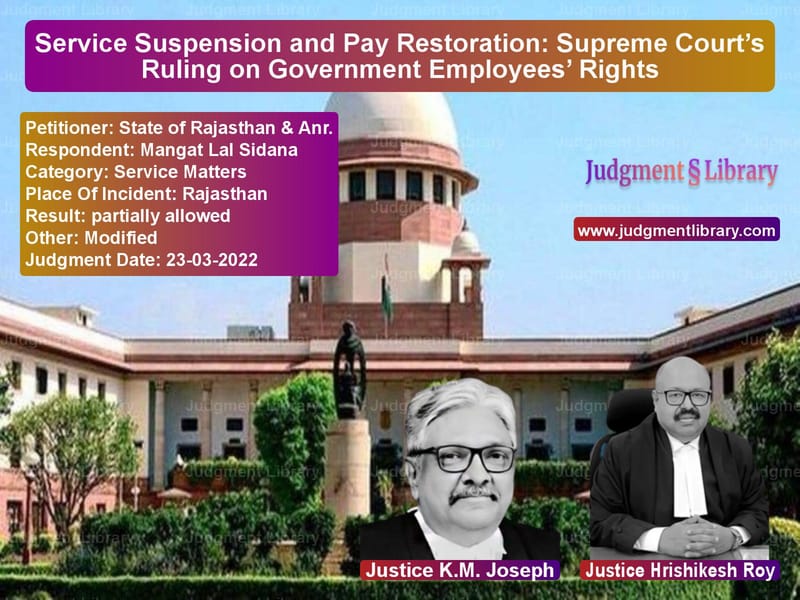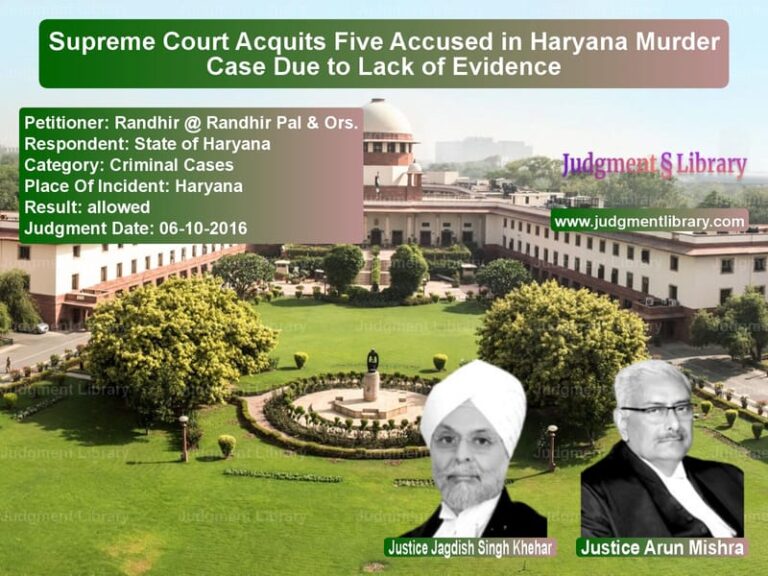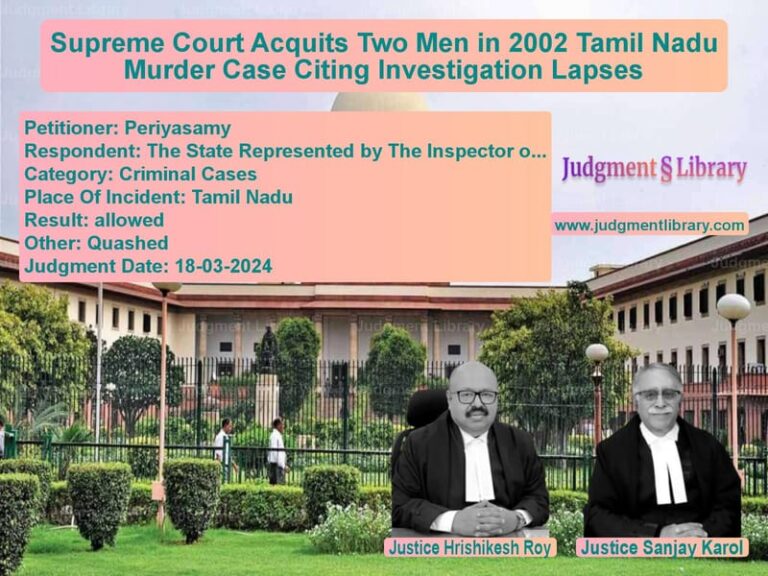Service Suspension and Pay Restoration: Supreme Court’s Ruling on Government Employees’ Rights
The case of State of Rajasthan & Anr. vs. Mangat Lal Sidana is a significant ruling that deals with the rights of government employees who have faced suspension and disciplinary action. The Supreme Court ruled on the interpretation of Rule 54 of the Rajasthan Service Rules, 1951, which governs the payment of salary and benefits to reinstated employees.
The judgment clarifies the conditions under which an employee is entitled to back wages, particularly when they have faced penalties such as suspension or compulsory retirement. It also highlights the importance of following the principles of natural justice when determining an employee’s financial dues after disciplinary proceedings.
Background of the Case
The case involved two government employees who were subjected to disciplinary action. The primary appellant, Mangat Lal Sidana, was an Assistant Engineer in the Rajasthan government. He was placed under suspension in 1981 pending disciplinary proceedings. Initially, he was awarded the penalty of compulsory retirement. However, after a legal challenge, the penalty was revised to withholding of three grade increments with cumulative effect. Subsequently, the penalty was further reduced to censure.
Despite this, the Rajasthan government treated the period of his absence from duty as applicable only for pension purposes, refusing to grant full salary benefits for the period of suspension. This led to a legal battle where he challenged the decision.
Legal Issues Considered
- Whether the period of suspension should be treated as duty for all benefits, including full wages.
- Whether the government was justified in withholding salary and benefits despite the exoneration of the employee.
- The correct interpretation of Rule 54 of the Rajasthan Service Rules, 1951, in cases where an employee is reinstated with minor penalties.
Petitioner’s Arguments (State of Rajasthan)
- The government argued that full benefits under Rule 54(2) should only be granted in cases where an employee is fully exonerated. Since Mangat Lal Sidana had been given the minor penalty of censure, he was not entitled to full wages.
- The government relied on Rule 54(3), which states that when an employee is not fully exonerated, the competent authority can decide the amount of salary payable.
- The government claimed that paying full back wages in such cases would set an incorrect precedent and impose an unfair financial burden.
Respondent’s Arguments (Mangat Lal Sidana)
- The employee’s counsel argued that since the major penalty of compulsory retirement was overturned, he should be treated as fully exonerated.
- The principle of natural justice was violated as the government did not issue a formal notice before passing the final order on his salary entitlement.
- Rule 54 should be interpreted in a manner that protects employees from unjust financial losses, particularly when penalties are later reduced.
Supreme Court’s Judgment
The Supreme Court bench, comprising Justices K.M. Joseph and Hrishikesh Roy, delivered a judgment balancing both perspectives. The Court ruled that:
“The disciplinary proceedings against the respondents have not culminated in a situation where it could be said that they have been completely exonerated. This would take their case outside the four walls of Rule 54(2) of the Rules.”
The Court emphasized that the correct provision applicable was Rule 54(3), which states that employees not fully exonerated are entitled to a portion of their salary and benefits.
However, the Court acknowledged that the government had failed to follow the principles of natural justice by not providing notice before finalizing the pay decision. To ensure fairness, the Court ruled:
“To remit it back for this purpose in our view would be inequitable. Hence, we would rather adopt the middle path by directing that in the facts and circumstances of the case, the respondents be paid pay and allowances fixed at 50 per cent of the pay and allowances which they would have drawn for the period of their absence.”
Key Takeaways from the Judgment
- The Supreme Court reaffirmed that employees who are not fully exonerated cannot claim full back wages under Rule 54(2).
- Government employees subjected to minor penalties are entitled to partial back wages, as determined by the competent authority.
- The ruling underscores the importance of natural justice, requiring that employees be given a chance to present their case before final salary decisions are made.
- The Supreme Court adopted a middle path by awarding 50% back wages instead of either full benefits or no benefits.
Implications of the Verdict
This judgment has significant implications for government employees facing suspension or disciplinary action. It establishes that:
- Full back wages will only be granted when an employee is completely exonerated.
- Employees who receive minor penalties such as censure or withholding of increments are entitled to some financial compensation.
- The government must follow due process before making financial decisions affecting reinstated employees.
The ruling also provides clarity for government departments, ensuring that decisions on salary entitlements are made fairly and in accordance with Rule 54.
Ultimately, this decision reinforces the principle that employees should not be financially penalized unjustly, while also maintaining the government’s authority to regulate service conditions within a structured legal framework.
Petitioner Name: State of Rajasthan & Anr..Respondent Name: Mangat Lal Sidana.Judgment By: Justice K.M. Joseph, Justice Hrishikesh Roy.Place Of Incident: Rajasthan.Judgment Date: 23-03-2022.
Don’t miss out on the full details! Download the complete judgment in PDF format below and gain valuable insights instantly!
Download Judgment: state-of-rajasthan-&-vs-mangat-lal-sidana-supreme-court-of-india-judgment-dated-23-03-2022.pdf
Directly Download Judgment: Directly download this Judgment
See all petitions in Employment Disputes
See all petitions in Pension and Gratuity
See all petitions in Disciplinary Proceedings
See all petitions in Judgment by K.M. Joseph
See all petitions in Judgment by Hrishikesh Roy
See all petitions in partially allowed
See all petitions in Modified
See all petitions in supreme court of India judgments March 2022
See all petitions in 2022 judgments
See all posts in Service Matters Category
See all allowed petitions in Service Matters Category
See all Dismissed petitions in Service Matters Category
See all partially allowed petitions in Service Matters Category







